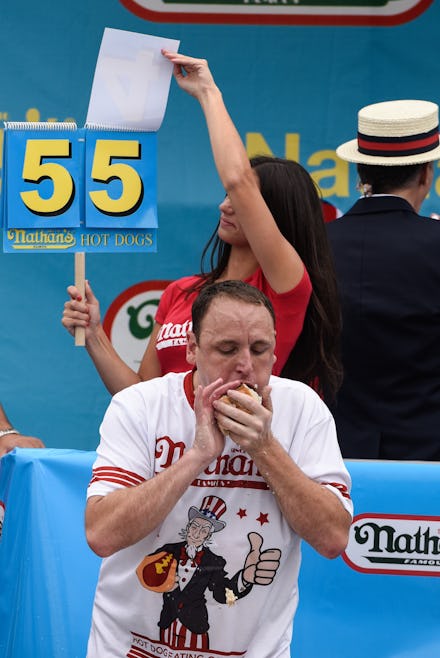This Is What Competitive Eating Does to Your Body

When Joey "Jaws" Chestnut eats, it's a wonder of God. On July 4, 2007, when Jaws took down six-time Nathan's Hot Dog Eating Contest winner Takeru Kobayashi by eating 66 hot dogs (with buns) in 12 minutes, the sheer volume of food he consumed wasn't the incredible part. It's a wonder of God that Chestnut's organs didn't stage a mutiny. Because to the human body, competitive eating is a physiological cage match.
Competitive eating, at its most basic, is to eat either the most or the fastest or both. For Chestnut, and any other competitive eater, that means subjecting your body to an incredibly high intake of not just food volume, but the vitamins and minerals contained within.
"You're putting down a lot of food in a short amount of time," Dr. Nieca Goldberg, cardiologist and medical director of the Joan H. Tisch Center for Women's Health at New York University Langone Medical Center, said in a phone interview.
Your body's motility, the contraction of muscles that mix and move your food in your gastrointestinal tract, is made to handle the three square meals (plus snacks) you're used to — not enough hot dogs to feed a literal platoon.
"These people put themselves at risk of esophageal tears, aspiration, nausea and vomiting, distention and abdominal pain," Goldberg said.
Esophageal tears, for people who don't spend a lot of time puking their guts out, are considered medical emergencies if they cause bleeding, leading to bloody poop and bloody puke, Goldberg said.
Aspiration happens when food that you're trying to puke out goes into your lungs instead of the Coney Island boardwalk, which can lead to a form of pneumonia. "Since it's partially digested food, it means a lot of acid gets into your lungs," Goldberg said.
And remember that thing about getting a surplus of vitamins and minerals? Hot dogs have sodium in spades.
A Nathan's Famous Hot Dog, with the bun, has 710 milligrams of sodium. According to Goldberg, someone with heart problems should shoot for fewer than 1,500 milligrams daily, or 2,000 milligrams if you're healthier. When Chestnut trounced Kobayashi, he ate roughly 46,860 milligrams of sodium in his winning meal.
"That much sodium can potentially become toxic," Goldberg said. "You can get fluid retention and your blood pressure rises. You can counterbalance with hydration ... but on a hot day, that's hard, and it can be dangerous."
Most people aren't competitive eaters and, even if they try, won't hit numbers like Jaws did. But for anyone who's gonna try their hand — and guts — at competitive eating on July 4, just think of your poor, overworked esophagus.
Read more: